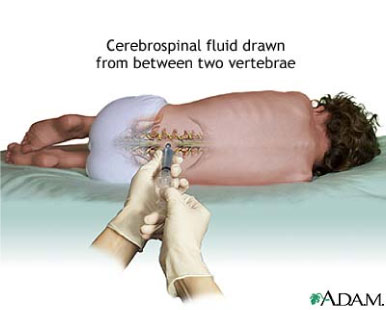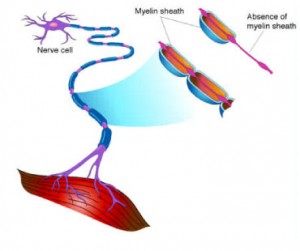Multiple Sclerosis
Posted on May 10th, 2011 by Andries
Multiple sclerosis (MS) is a chronic neurological disorder that affects the Central Nervous System (CNS) which consist of the brain and spinal cord, which though slow in its onset , in time may produce marked symptoms, such as paralysis and tremors and ultimately result in a severely disabled invalid.
The purpose of the myelin sheath is to speed the transmission of impulses along nerve cells MS is known as a autoimmune disease that self destructs the myelin sheath , the insulation that surrounds and protects the nerve cell, which helps nerve fibers conduct electrical impulses. Due to the self destruction of the myelin sheaths, myelin may be lost over internodes of many axons, therefore conduction of nerve impulses may be slowed and blocked, and therefore acts abnormal. Ability of the nerves to conduct electrical impulses to and from the brain is therefore disrupted and results in loss of motor control and other symptoms of MS. Signs and Symptoms List as possible indicators of MS:
- Muscle weakness in the legs and poor coordination
- Spasticity, the inability to control muscle tone and leads to spasms and stiffness.
- Impairment of pain, temperature, touch senses
- Pain (moderate to severe)
- Ataxia, problem with coordination
- Tremor, uncontrollable shaking or trembling
- Speech disturbances or dysarthria, the slow, slurred speech, synonymous with “scanning speech”
- Vision disturbances or optic neuritis, as well as nystagmus (the involuntary jerking and movement of the eye)
- Vertigo
- Bladder dysfunction, massive central sequestration of the disc at the L4-L5 level involves all of the nerve roots in the caude equina and may result in bowl and bladder paralysis.
- Bowel dysfunction
- Sexual dysfunction
- Depression
- Euphoria
- Cognitive abnormalities
- Fatigue, typically worse in the afternoon and may be accompanied by an increase in body temperature.
Every individual is different, therefore every person will vary dramatically from the other. Symptoms are problems that are reported by the person self. It might appear in any combination and with different severities. Symptoms will vary for unpredictable periods of time, but symptoms alone don’t indicate MS. These symptoms experienced by the person might be unrelated to MS. Initially a doctor or neurologist will complete a medical history and physical examination including a detailed neurological examination. Diagnosing MS is very difficult because there is no single test to diagnose MS. There are four tests that’s involved with diagnosing MS:
- Magnetic Resonance Imaging (MRI) – The MRI scan is a diagnostic tool that currently offers the most sensitive non-invasive way of imaging the brain.

Figure 2. MRI scans (post-contrast) of the same brain slice at monthly intervals. Bright spots indicate active lesions.
- Visual Evoked Potential (VEP) – It’s a electric diagnostic test indicating slowaging of messages in different parts of the brain. Evidence of scarring along pathway of the nerve will be displayed if positive for MS
- Cerebrospinal fluid – Spinal fluid is extracted through a lumbar puncture where fluid is tested for levels of certain immune system proteins and for the presence of a staining pattern of antibodies called oligoclonal bands which indicates an immune response within the CNS. Oligoclonal bands are found in the spinal fluid of 90-95% of people with MS.

Figure 3. Illustration of excecuting a lumbar puncture showing the placement of insertion, usually between the 3rd and 4th lumbar vertebrae
- Blood tests – blood tests done to rule out various other neurological diseases, certain hereditary disorders, and AIDS
Treatment
There is no cure for MS currently, but there are treatments available that may slow its progression and alleviate associated symptoms. Medications can be taken to target the body’s immune system to reduce frequency and duration of attacks. Additional medication may be taken for other symptoms, such as pain or depression.
Exercise is an important component in managing MS. Increased activity of an individual with MS is less likely to develop certain complications, such as bladder and bowel dysfunction, osteoporosis, permanent muscle contractions, or ulcerations of the skin. MS symptoms can temporarily worsen during physical activity, therefore training program needs to be individualized as well as planned carefully and thoroughly by a health professional.
Tweet
